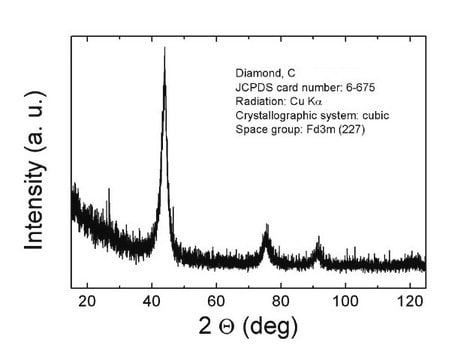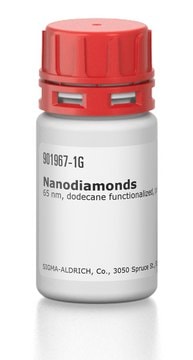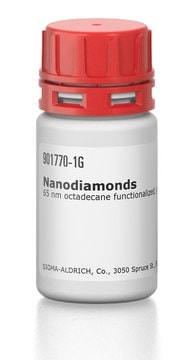483591
Diamond
synthetic monocrystalline powder, ≤1 μm
Sign Into View Organizational & Contract Pricing
All Photos(1)
About This Item
Empirical Formula (Hill Notation):
C
CAS Number:
Molecular Weight:
12.01
EC Number:
MDL number:
UNSPSC Code:
12352103
NACRES:
NA.23
Recommended Products
form
synthetic monocrystalline powder
particle size
≤1 μm
density
3.5 g/mL at 25 °C (lit.)
application(s)
battery manufacturing
Looking for similar products? Visit Product Comparison Guide
Related Categories
Application
Monocrystalline diamond particles internalized in human endothelial cells have potential applications in drug delivery.
Storage Class Code
11 - Combustible Solids
WGK
nwg
Flash Point(F)
Not applicable
Flash Point(C)
Not applicable
Personal Protective Equipment
dust mask type N95 (US), Eyeshields, Gloves
Certificates of Analysis (COA)
Search for Certificates of Analysis (COA) by entering the products Lot/Batch Number. Lot and Batch Numbers can be found on a product’s label following the words ‘Lot’ or ‘Batch’.
Already Own This Product?
Find documentation for the products that you have recently purchased in the Document Library.
Micron-sized diamond particles are internalized by endothelial cells.
Walkowiak B, et al.
Diamond and Related Materials, 18, 651-656 (2009)
Jayakumar Shalini et al.
Nanoscale, 5(3), 1159-1167 (2013-01-05)
Significant difference was observed for the simultaneous detection of dopamine (DA), ascorbic acid (AA), and uric acid (UA) mixture using nitrogen incorporated diamond nanowire (DNW) film electrodes grown by microwave plasma enhanced chemical vapor deposition. For the simultaneous sensing of
P Pereira Nogueira et al.
The Journal of clinical pediatric dentistry, 37(1), 53-57 (2013-01-25)
The aim of the present study was to evaluate hybrid layer thickness of primary molars sectioned with diamond, carbide and ultrasonic CVD burs. The occlusal enamel surfaces often molars were removed and superficial dentin was exposed. Three standardized cavities were
Mikhail V Korobov et al.
Nanoscale, 5(4), 1529-1536 (2013-01-15)
Detonation nanodiamond (ND) is a suitable source material to produce unique samples consisting of almost uniform diamond nanocrystals (d = 3-5 nm). Such samples exist in the form of long stable aqueous dispersions with narrow size distribution of diamond particles.
Brian McCall et al.
Optics express, 21(3), 3557-3572 (2013-03-14)
A novel method for fabricating lens arrays and other non-rotationally symmetric free-form optics is presented. This is a diamond machining technique using 4 controlled axes of motion - X, Y, Z, and C. As in 3-axis diamond micro-milling, a diamond
Our team of scientists has experience in all areas of research including Life Science, Material Science, Chemical Synthesis, Chromatography, Analytical and many others.
Contact Technical Service







